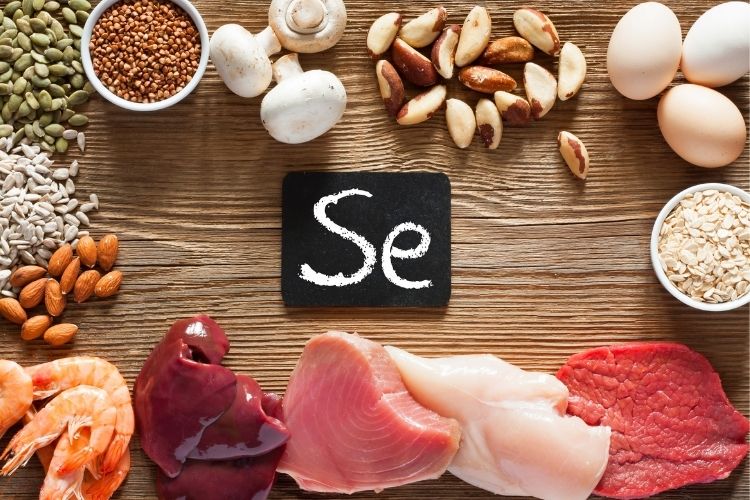Selenium is a trace element with significant functions in antioxidants and the immune system. Selenium plays a role in hormone synthesis, genetic structure, vitamin and mineral metabolism, muscle performance, and anticarcinogenic processes in the body. It is effective in enhancing athletic performance and wound healing. It is primarily found in fish and seafood, dairy products, vegetables, and legumes. If you are wondering “What is selenium?” you can continue reading the article.
What is Selenium?
Selenium is a mineral that plays a role in physiological processes affecting many systems in the body. It is involved in the central nervous system and muscle functions, male reproductive health, hormonal and cardiovascular systems, and immune responses. Selenium levels in the body can be affected by pathological conditions targeting the immune system. There are multiple forms of selenium. Organic forms include selenate and selenite, while inorganic forms include selenomethionine and selenocysteine. All forms of selenium can be dietary sources. The form of selenium found in human and animal tissues is selenomethionine, which is also the predominant form digested and absorbed in the human digestive system. Naturally, selenium is present in foods such as meat, seafood, dairy products, nuts, grains, and vegetables. It can also be added to packaged foods or consumed as a supplement.

What is Selenium?
Selenium is primarily stored in skeletal muscle, accounting for 28-46% of total selenium. The remainder is found in the liver, kidneys, other organs, and blood. Selenium, which can regulate the reproductive system and thyroid hormone mechanisms, helps reduce oxidative damage caused by free radicals. Oxidative stress is caused by substances that can damage tissues and organs under various conditions. Selenium, acting as an antioxidant, plays an active role in protecting cells. It also has roles in DNA synthesis and vitamin E modulation. Selenium is an essential trace mineral necessary for recovery and performance enhancement in physically active individuals post-training. Selenium levels in the body are monitored through plasma and serum concentrations. Measuring the amount of selenium in blood and urine can provide information about recent selenium levels.
What is Selenium Used For?
Selenium is a component of selenoprotein enzymes and proteins that contribute to DNA synthesis and immune response. The benefits of selenium can facilitate physiological processes. The mechanisms and pathways selenium affects in the body may include:
- Acting as an antioxidant, it helps break down peroxides.
- It facilitates the conversion of thyroid hormone to its active hormone form.
- It aids in strengthening immune functions.
- Plays a role in the production of lymphocytes and T cells, which are types of white blood cells.
- Contributes to the improvement of hair, skin, and nail health.
- Supports reducing the risk of developing acquired immunodeficiency syndrome in severe infection cases like HIV.
- It is associated with the presence of more and healthier oocytes (immature egg cells) and ovarian follicles in women, thereby playing a role in enhancing fertility.
- Helps reduce the risk of pregnancy complications such as preterm birth, preeclampsia, low birth weight, gestational diabetes, and restricted fetal growth.
- Shows neuroprotective effects against inflammation and oxidative damage, which can help prevent the development of inflammatory diseases like Alzheimer’s and dementia.
Additionally, selenium may be effective in preventing and treating mild cognitive impairments. Together with antioxidant vitamins A, C, and E, it can prevent cell and tissue damage

What is Selenium?
What is Selenium Deficiency?
Selenium is a mineral of vital importance in the protection and enhancement of human health, playing a role in many physiological processes. Although selenium deficiency is not a commonly seen health problem, it is a critical condition. Selenium deficiency can be managed with enriched or fortified foods and supplements. It may be associated with certain diseases. A type of cardiomyopathy or heart muscle disease known as Keshan disease is linked to severe selenium deficiency. Keshan disease is characterized by peripheral myopathy, decreased muscle tone, changes in skin, hair, and nails, and anemia. Additionally, Kashin-Beck disease, a type of osteoarthritis, can result from insufficient selenium levels in the body. Conditions like diarrhea, malabsorption of nutrients, and loss of appetite associated with HIV may also carry a risk of selenium deficiency.
In individuals with kidney diseases, the dialysis method used can remove some selenium from the body, leading to selenium deficiency. Furthermore, individuals with kidney diseases may experience selenium deficiency due to restrictive diets. The uptake of selenium by plants and its transportation to animal tissues is significantly influenced by soil conditions. In areas with lower selenium levels, plant sources may be inadequate, which can also affect animals. Additionally, vegetarian and vegan individuals living in these regions may have a higher risk of selenium deficiency. Pregnant and breastfeeding women, individuals with alcohol dependency, those with coronary heart disease and acute myocardial infarction, patients with liver cirrhosis and on parenteral nutrition, and people with malabsorption can also experience selenium deficiency.
Glutathione peroxidase, which protects cells from the adverse effects of lipid peroxides, is an enzyme where selenium plays an active role. Insufficient selenium levels can contribute to the development of cardiovascular and nervous system disorders and various carcinomas. Effects seen in selenium deficiency include cellular damage following exposure to heavy metals and a weakened immune system. Symptoms of selenium deficiency can include nausea and vomiting, confusion, lethargy, headache, seizures, and coma. Additionally, selenium deficiency during pregnancy can lead to miscarriage, a weakened immune system, low birth weight, and damage to the fetal nervous system. In men, it can disrupt sperm structure and characteristics, potentially leading to infertility. In cases of selenium deficiency in both men and women, supplementation may be necessary.
What Foods Contain Selenium?
Approximately 60% of dietary selenium is absorbed in the small intestine. The absorption of selenium can be increased up to 85% by amino acids. In response to the question, “What contains selenium?” the following can be listed:
- Nuts such as Brazil nuts and cashews,
- Fish and seafood including tuna, sardines, shrimp, and lobster,
- Chicken, turkey, beef, beef liver, and ham,
- Pasta, rice, beans, lentils, wheat germ and flour, whole wheat bread,
- Dairy products like milk, yogurt, and cheese,
- Fortified cereals and oatmeal,
- Fruits and vegetables such as spinach, carrots, lettuce, potatoes, bananas, and peaches.

What is Selenium?
Plants absorb selenium from the soil, and it is distributed into the tissues of animals that feed on these plants. The selenium content in plants can vary from region to region based on the soil content. The presence of an appropriate form of selenium, the pH of the soil, and the organic matter in the soil also affect the selenium amount in plants. Therefore, the amount of selenium passed to plants and animals can vary depending on the soil type. Animal tissues rich in protein are good sources of selenium. Offal, fish, shellfish, and Brazil nuts are among the richest foods in selenium. The recommended amount of selenium is 60 μg/day for women and 70 μg/day for men. Pregnant and breastfeeding women need about 20 μg/day. Insufficient selenium intake can lead to various health problems.
Does Selenium Affect Sports Performance?
Selenium, found naturally in foods, dietary supplements, and added to processed foods, is an essential mineral in athlete nutrition. Known for its antioxidant properties, adequate consumption of selenium plays a role in enhancing athletic performance. However, the benefits of selenium for athletes can include:
- Accelerating the healing process in sports injuries or traumas.
- Protecting muscles from oxidative stress and associated damage.
- Speeding up muscle recovery post intense strength training in conjunction with antioxidant vitamins (A, C, E).
- Helping to reduce inflammation in the body.
- Supporting the enhancement of mental focus.
- Assisting in managing overtraining syndrome.
- Potentially having positive effects in the treatment of Osgood-Schlatter disease.
Selenium enhances the body’s resistance against cell damage and supports the immune system, thus increasing endurance and strength in athletes. Low selenium levels in the body are associated with elevated C-reactive protein in the presence of inflammation. It plays a role in reducing inflammation levels and in the course of anti-inflammatory processes. Thus, it can prevent sports injuries and speed up the recovery process. The harmful effects of oxidative stress formed in response to exercise can be prevented by the glutathione peroxidase mechanism, which is facilitated by adequate selenium. A deficiency in selenium can disrupt the activity of glutathione peroxidase and may also lead to decreased neurological performance in athletes.
Significant losses can occur in athletes during high-intensity and high-volume training. Selenium can play a role in maintaining optimal electrolyte levels, reducing stress, and supporting recovery. In this regard, antioxidant selenium support through foods and supplements is necessary in athlete nutrition. Consuming foods naturally rich in selenium ensures the intake of recommended amounts. Excessive selenium supplementation without medical supervision can overstimulate mitochondrial oxidative stress and lead to serious health issues, potentially resulting in damage and dysfunction in cellular organelles.
Selenium, a trace element, is crucial for the functions of the nervous and muscular systems, hormone regulation, and immunity. It plays a critical role in various cellular, tissue, and systemic tasks. Selenium is an essential mineral that must be consumed in adequate amounts in infants, children, adults, the elderly, and athletes involved in complex metabolic processes. In cases of deficiency, various physiological processes may be adversely affected, necessitating the treatment of selenium deficiency.


